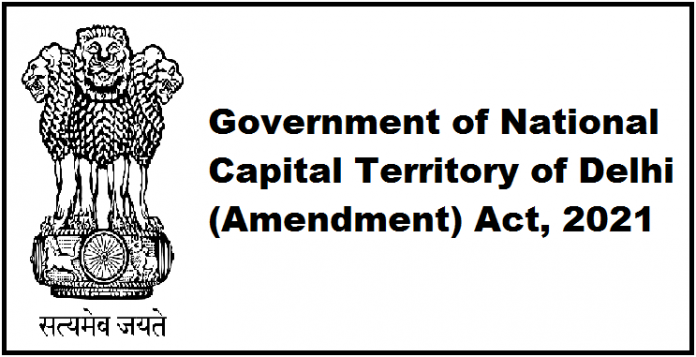Hello everyone!
Today we are here with another very important topic which has been in the news for the past few days. In this article, we are going to discuss the Government of the National Capital Territory of Delhi (Amendment) Act, 2021. This act recently got assent from the President.
Table of Contents
What is the Government of NCT of Delhi (Amendment) Act all about?
The Government of NCT of Delhi (Amendment) Act, 2021 amends the Government of National Capital Territory of Delhi Act, 1991. It provides a framework for the functioning of the Government of Delhi and the Legislative Assembly. It received the presidential assent on March 28, 2021. The Lok Sabha passed the bill on March 22, 2021. Then, Rajya Sabha passed the amendment on March 24, 2021. However, AAP, Congress, and other opposition parties walked out of the Rajya Sabha.
The Act provides more power to the Lieutenant Governor (LG) of the National Capital Territory of Delhi. At the same time, it diminishes the elected government’s power. The Act also seeks to bring some clarity on certain subjects in the 1991 Act. Some of the key points of this Act are:
- Amendments to the sections (21, 24, 33, and 44) of the Government of National Territory of Delhi Act, 1991.
- It gives more power to the LG in some respects while ensuring the accountability of the Delhi Legislative Assembly.
- It aims to provide clarity on the matters or proposals which are needed to be submitted to the LG before issuing an order thereon.
- Also, it aims to “further define the responsibilities of the elected government and Lieutenant Governor (LG) in Delhi”.
Before delving deep into the details of this act, let’s first look at the background and present Delhi administration structure.
Background of the Delhi’s Government Administration
- Delhi’s current status as a Union Territory with a Legislative Assembly is an outcome of the Government of National Capital Territory of Delhi Act, 1991 through which Articles 239AA and 239BB were introduced in the Constitution.
- The 69th Constitutional Amendment Act of 1991 conferred the Union Territory of Delhi with a special status, and redesignated it as the ‘National Capital Territory of Delhi’ and designated its administrator as the Lieutenant Governor (LG).
- It conferred on the assembly the power to legislate on all matters in the state list as well as the concurrent list except land, police and public order.
- It carried forward a provision from the Government of Union Territories Act, 1963, namely, that in case of a difference between the LG and the council of ministers on any matter, it shall be referred to the President by the LG for his/her decision and pending such decision, the LG can take any action on the matter as he/she deems appropriate.
- In 2018, the constitution bench of the Supreme Court passed a verdict stating that the LG’s concurrence is not required on issues other than police, public order and land. It also added that the decisions of the council should be communicated to the LG. After this verdict, the LG was bound by the aid and advice of the council of ministers.
- Encouraged by this verdict, the elected government had stopped sending files on executive matters to the LG before the implementation of any decision. It has been keeping the LG informed of all administrative developments, but not necessarily before implementing or executing any decision.
- Due to this ambiguity in the role of Lieutenant Governor, the new amendments have been brought about.
Provisions of the GNCTD Act, 2021
The important provisions of the Government of NCT of Delhi (Amendment) Act, 2021:
- The term ‘government’ mentioned in any law enacted by the legislative assembly of Delhi shall mean the Lieutenant Governor.
- Now, the LG has discretionary powers even in matters where the Legislative Assembly of Delhi is empowered to make laws.
- The Amendment added an additional clause added to Section 44 of the 1991 Act making it mandatory for the government to obtain the opinion of the LG on all matters before execution.
- It also mentions that the “Legislative Assembly shall not make any rule to enable itself to consider the matters of the day-to-day administration of the Capital or conduct inquiries in relation to the administrative decisions”.
Concerns and Issues with the Government of NCT of Delhi (Amendment) Act
The current state government and opposition parties have objected to the enactment of the GNCT Amendment Act. They have called it unconstitutional. They fear that equating the LG with the government simply hinders the legitimacy and autonomy of the elected government. By providing excess powers to LG can also disturb the federal equilibrium. The center can use this bill as an instrument to curtail the powers of other states in the future. It might also affect the efficiency of the government to make quick decisions on pressing matters. It will have to wait till the LG gives his/her approval.
Conclusion
Overall, the Act aims to provide clarity on the roles and responsibilities of the elected government and Lieutenant Governor (LG) in Delhi. But the government at the center and state must cooperate and work together to maintain the essence of the democratic and federal structure of the country.
So this was all about the Government of NCT of Delhi (Amendment) Act, 2021. We have covered all the major aspects of it in great detail. Hope you find it interesting and informative. For more such informative articles, stay tuned!
Thank you




